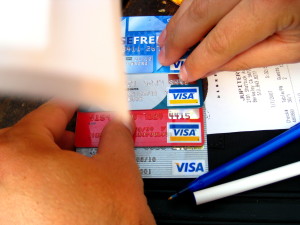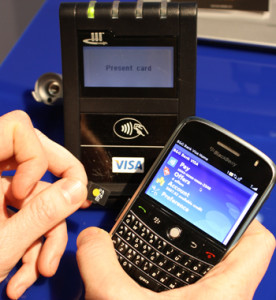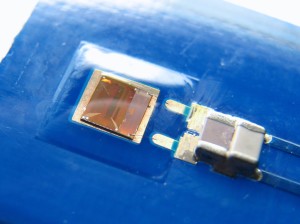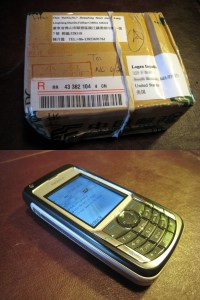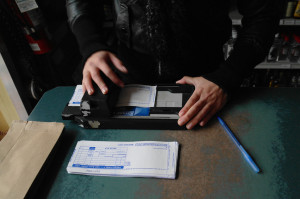August 8th, 2014 by Elma Jane
Visa Inc., the global leader in payments, is helping U.S. fuel retailers prevent credit and debit card fraud at the pump with intelligent analytics that identify higher-risk transactions that may be fraudulent. Visa Transaction Advisor uses sophisticated analytics based on the breadth and scale of VisaNet data to flag the riskiest transactions by working with fuel companies to understand their needs, creating a new service that builds on Visa’s predictive analytics capabilities, providing fuel merchants with more intelligence to prevent fraud and improve their bottom line. While global fraud rates across the Visa payment system remain near historic lows, less than 6 cents for every $100 transacted – fuel pumps can be targets for criminals because they are often self-service terminals. The new solution, Visa Transaction Advisor (VTA), enables merchants to use real-time authorization risk scores to identify transactions that could involve lost, stolen or counterfeit cards. A pilot test of the new service showed a 23 percent reduction in the rate of fraudulent transactions – all without costly infrastructure upgrades or disruption of the customer experience.
How It Works
After a cardholder inserts the card at the pump, Visa analyzes multiple data sets such as past transactions, whether the account has been involved in a data compromise and nearly 500 other pieces of data to create a risk score. This allows merchants to identify those transactions with a higher risk of fraud and perform further cardholder authentication before gas is pumped. The time and costs associated with resolving fraudulent transactions can be substantial for both merchants and financial institutions and inconvenient for cardholders, which is one of the reasons why fraud prevention is critical. Visa’s solution is easy to implement, using existing message fields and formats as well as pump software or hardware to ensure minimal impact to merchants and acquirers. Several fuel merchants who piloted the technology over the last several months noticed a decrease in fraud, without negatively impacting their consumers’ experience. VTA as a tool help mitigate fraudulent transactions. A 23 percent reduction in the rate of fraudulent chargebacks during a pilot program in Los Angeles. This was done with minimal impact to the customer experience, making secure payment at the pump as convenient as possible. Providing fuel to millions of customers each month through approximately 15,000 service stations in the United States, said US Credit Card Operations Manager, from Shell, considering new solutions and technology it has to have a clear business benefit, be customer-centric and easy to implement. With no infrastructure investment, testing VTA as part of proactive fraud prevention tool-set to better identify fraudulent card activity earlier in the transaction cycle, without inconveniencing customers.
Visa Transaction Advisor is available to merchants through participating U.S. acquirers. Visa has partnered with Vantiv and is also working with other acquirers to offer the service to its fuel clients. Ease of implementation is a critical requirement whenever talking about a new merchant service. Visa Transaction Advisor builds on existing payment infrastructure, is easy to implement and flexible enough to allow customization by merchants.
Posted in Credit Card Security, EMV EuroPay MasterCard Visa, Visa MasterCard American Express Tagged with: account, acquirers, analytics, authorization, card, cardholder, counterfeit cards, credit, Credit Card Operations, customer, data, debit, financial institutions, fraud, higher-risk transactions, Merchant's, payments, Rates, retailers, terminals, transactions, visa, Visa payment, Visa Transaction, Visa Transaction Advisor, VisaNet, VTA
April 15th, 2014 by Elma Jane
Amsterdam, Netherlands-based Cardis has been piloting its technology in Europe with Raiffeisen Bank in Austria and Sberbank in Russia. They are now focused on the U.S., as this is the fastest growing mobile payments market in the world, where there’s a huge opportunity. Integration of technology with a large U.S. processor and with a major U.S. retail brand, which will be launching a mobile site and mobile app using Cardis solution.
Cardis International is planning an April launch in the U.S. for its technology, which enables merchants to accept low-value contactless or mobile payments without incurring high processing charges. Cardis is able to bring down the processing cost of low-value payments, the company said, by aggregating multiple transactions into a single payment.
The problem
Contactless card and NFC-based mobile payments are typically for low amounts, and yet still use a card processing infrastructure that was designed 40 years ago when the average credit card transaction was $100.
Traditional card processing systems require each transaction to be individually processed through the payment system, including authorization, clearing and settlement. The resulting variable costs of processing each transaction are independent of the transaction amount and too high for low-value payments, particularly in low-margin industries such as quick-service restaurants. QSR restaurants often have a 3 percent profit margin, yet, for low-value contactless payments, the processing cost could be as high as 6-7 percent of the transaction value.
Mobile and contactless cards offer consumers a convenient form factor. But they don’t solve the problem that low-value card payments are very expensive for merchants.
As an ever-increasing percentage of transactions have become cashless, card processing fees have become a significant cost. Costs that are based on the number of transactions, rather than their value. With average per person expenditures of $5 or under, feels each swipe fee much more than a business where customers spend $50 or more. But not accepting credit/debit cards for low-value transactions isn’t an option as many of customers don’t carry cash anymore.
Aggregation
Cardis’ solution is to act as an aggregator of low-value payments, sending a single batched transaction through to a processor instead of multiple low-value transactions. As there is no per transaction processing of individual low-value purchases, the cost-per-transaction is significantly reduced.
Cardis provides its technology as a software plug-in to payment service providers for contact-based and contactless card payments, mobile wallet transactions and NFC payments.
There are two models. For card payments, it will aggregate multiple purchases by an individual cardholder at a single merchant on a post-paid basis up to a specific amount, for example $20. To guarantee payment to the merchant, since the aggregated transaction is processed at a later date, it will pre-authorize an amount, for example $15, the first time the customer makes a purchase at that merchant.
Alternatively, merchants can opt for Cardis’ prepaid system. This involves the consumer setting up a prepaid account hosted by Cardis’ sponsoring bank that is topped up via ACH (automated clearing house) transfers. Using the Cardis prepaid account on a smartphone provides the digital equivalent to cash.
With its post-paid solution, merchants will save 30-50 percent per transaction compared to conventional card processing fees, while its prepaid solution saves merchants 80 percent per transaction. With the post-paid solution, it will only aggregate a customer’s purchases at a single specific merchant. But, as the prepaid solution aggregates the customer’s purchases across multiple merchants, this enables to offer a much lower processing fee to the merchant.
Cardis provides an audit trail enabling consumers to track individual transactions that are aggregated using its technology. Consumers don’t lose any of their card protection rights and guarantees by agreeing to let a merchant aggregate their payments through Cardis. They can always charge back any disputed transactions.
Cardis sees opportunities for digital content providers such as online music stores and games providers to use its aggregation technology. It can integrate solution with existing digital wallets.
Raiffeisen
In 2012, Austria’s Raiffeisen Bank launched a pilot of Cardis technology for NFC-based Visa V Pay debit card payments in partnership with Visa Europe. Raiffeisen’s MobileCard mobile payment product uses a secure element stored on an NFC-enabled MicroSD card inserted in a mobile phone. Although Cardis supports secure elements stored on SIM cards as well as on MicroSD cards and on the cloud, Raiffeisen opted for MicroSD cards, as this is an easier solution to implement.
Raiffeisen cardholders participating in the pilot use MobileCard on average three times a week, with an average transaction value of ($5.70). Merchants accepting MobileCard are seeing 40 percent to 70 percent lower merchant processing fees for an average transaction value of ($5.43) to ($13.60).
Spindle
In October 2013, Spindle, a U.S. mobile commerce company, signed an agreement with Multi-max, a manufacturer of vending machines for mid-size and small offices throughout North America, Europe and Asia. Spindle will integrate its MeNetwork mobile commerce technology into Multi-max’s line of K-Cup vending machines for rollout across the U.S.
The MeNetwork solution will incorporate all card-based payment acceptance services, as well as mobile marketing services. Spindle’s partner Cardis will provide low-value payment processing services for purchases at K-Cup vending machines.
Posted in Credit card Processing, Credit Card Security, Digital Wallet Privacy, e-commerce & m-commerce, Electronic Payments, Gift & Loyalty Card Processing, Internet Payment Gateway, Mobile Payments, Mobile Point of Sale, Near Field Communication, Payment Card Industry PCI Security, Smartphone, smartSD Cards, Visa MasterCard American Express Tagged with: accept, ach, aggregated, aggregation, aggregator, authorization, automated clearing house, average transaction, batched, card payments, card processing infrastructure, card processing systems, card-based payment acceptance, cardholders, clearing, contactless, contactless payments, cost-per-transaction, credit card transaction, debit card payments, Digital wallets, high processing charges, low-value payments, merchant aggregate, Merchant's, microSD, mobile app, mobile commerce, mobile payment, Mobile Payments, mobile site, mobile wallet transactions, nfc-based, payment service providers, pre-authorize, prepaid, processed, Processing, processing cost, processing fees, processor, settlement, smartphone, transactions, transfers
February 18th, 2014 by Elma Jane
Payment Tokenization Standards
Tokenization is the process of replacing a traditional card account number with a unique payment token that is restricted in how it can be used with a specific device, merchant, transaction type or channel. When using tokenization, merchants and digital wallet operators do not need to store card account numbers; instead they are able to store payment tokens that can only be used for their designated purpose. The tokenization process happens in the background in a manner that is expected to be invisible to the consumer.
EMVCo – which is collectively owned by American Express, Discover, JCB, MasterCard, UnionPay and Visa – has announced that it is expanding its scope to lead the payments industry’s work to standardize payment tokenization. EMVCo says that the new specification will help provide the payments community with a consistent, secure and interoperable environment to make digital payments when using a mobile handset, tablet, personal computer or other smart device.
Key elements of EMVCo’s work include adding new data fields to provide richer industry information about the transaction, which will improve transaction efficiency and enhance the consumer and merchant payment experience by helping to prevent fraudulent card account use. EMVCo will also create a consistent approach to identify and verify the valid use of a token during payment processing including authorization, capture, clearing and settlement.
EMVCo’s announcement follows an earlier joint announcement from MasterCard, Visa and American Express that proposed an initial framework for industry collaboration to standardize payment tokenization. EMVCo says it will now build on this framework with collective input from all of its members and the industry as a whole.
Posted in Credit card Processing, Credit Card Reader Terminal, Credit Card Security, Digital Wallet Privacy, Electronic Payments, Financial Services, Payment Card Industry PCI Security, Visa MasterCard American Express Tagged with: American Express, authorization, capture, card account numbers, clearing, data fields, device, digital payments, Digital Wallet, Discover, EMV, emvco, fraudulent card account, interoperable, jcb, MasterCard, merchant, mobile handset, payment, payment processing, payment token, secure, security standards, settlement, smart device, specification, standardize, tablet, token, tokenization, transaction, visa
October 11th, 2013 by Elma Jane
(Moto) Mail Order/Telephone Order Merchant – In the realm of credit card processing is defined as a merchant who manually keys in over 50% of their transactions and an Internet Merchant is one who accepts transactions over the Internet via an E-Commerce store with an online gateway or who submits transactions manually through a Virtual Terminal.
Qualified Transaction Conditions (For MOTO/Internet merchants the Mid-Qualified Rate is essentially the Qualified rate as these merchants never swipe a credit card through a terminal.)
One electronic authorization request is made per transaction and the transaction date is equal to the shipping date. The authorization response data must also be included in the settled transaction.
Additional data (sales tax and customer code) is required in the settled transaction on all commercial (business) cards at non-Travel & Entertainment (T&E) locations.
The authorization request message must include Address Verification Service (AVS), which verifies the street address and the zip code of the card holder. NOTE: The only way this happens is if your software is set up to do this, or, if you are using a terminal, then if you capture the AVS information at the time of keying in your transaction.
The settled transaction amount must equal the authorized amount.
The settled transaction must include the business’s customer service telephone number, order number, and total authorized amount.
The transaction is electronically deposited (batch transmitted) on or 1 day after authorization date.
The transaction/shipping date must be within 7 calendar days of authorization date.
Non-Qualified Transaction Conditions
One or more of the Qualified or Partially Qualified conditions were not met.
Commercial Card without the additional data.
The transaction was not electronically authorized or the authorization response data was not included in the settled transaction.
The transaction was electronically deposited (batch transmitted) greater than 1 day from transaction/shipping/authorization date, or:
The VISA Infinite card was accepted.
Commercial Card Additional Data
MasterCard
Corporate Data Rate II (Purchasing cards): Sales Tax and customer Code (supplied by cardholder at point of sale) Corporate Data Rate II (Business and Corporate cards): Sales Tax International Corporate Purchasing Data Rate II: Sales Tax and Customer Code (supplied by cardholder at point of sale)
The following information must also be provided: Merchant’s Federal Tax ID; Merchant Incorporation Status; and Owner’s full name if the merchant is a sole proprietor.
Visa
Purchasing cards: Sales Tax and Customer Code (supplied by cardholder at point of sale) Corporate and Business cards: Sales Tax
Posted in Credit card Processing, e-commerce & m-commerce, Electronic Payments, Internet Payment Gateway, Mail Order Telephone Order Tagged with: address verification service, authorization, avs, batch, business, corporate, credit card processing, data, e-commerce, electronically, entertainment, fax order, gateway, internet, internet merchant, keying, mail order, moto, phone order, qualified, settle, store, telephone order, transactions, transmit, travel, virtual terminal
October 10th, 2013 by Elma Jane
There are various payment processing rates that apply to credit and debit card transactions. Visa and MasterCard do not publish their rules and regulations or the payment processing standards required to get the lowest interchange rate. It’s up to credit card processing companies to understand and implement them to their merchants’ benefit. A high downgrade rate may indicate that your processor does not know the standards, or may be reluctant to implement best practices or new rules changes. The application of these rates is based on a variety of factors related to the particular circumstances of the sale and the way the payment is processed, as well as on the type of the card that was used. Typically payments processed in a card-not-present environment (e.g. online or over the phone) are assessed higher processing fees than payments processed in a face-to-face setting. Payments made with regular consumer types of cards are generally processed at lower rates than payments made with rewards, business-to-business or commercial cards. Debit cards are processed at lower interchange rates than credit cards. In order to simplify the pricing for their merchants, the majority of the processing companies have elected to use various tiered pricing models (two-tiered, three-tiered, six-tiered, etc.). There are three general classifications used in the various tiered pricing models:
Qualified Transaction (also referred to as the Swiped Rate) This is the rate charged per each transaction when the card is physically swiped through a credit card terminal. When a transaction is processed in accordance with the rules and standards established in the Payment Processing Agreement, signed by the merchant and the processing bank, and It involves a regular consumer credit card, It is processed at the most favorable rate. This rate is called a “Qualified Rate” and is set in the merchant’s Payment Processing Agreement. The Qualified Rate is set based on the way a merchant will be accepting a majority of their credit cards. For example, for an internet-based merchant, the internet interchange categories will be defined as Qualified, while for a physical retailer only transactions where cards are swiped through a terminal will be Qualified.
Mid-Qualified Transaction This is the rate charged when a transaction is manually keyed-in using AVS – Address Verification Service (card #, expiration date, address, zip code and CVV code all match). When a consumer credit card is keyed into a credit card terminal instead of being swiped or The cardholder uses a rewards card, business-to-business or another special type of card the transaction is charged a discount rate that is less favorable than the Qualified. This rate is called a “Mid-Qualified Rate.”
Non-Qualified Transaction This is the rate charged when manually keying-in a transaction without using AVS – Address Verification Service. When a special kind of credit card is used (like a rewards card or a business card), or a payment is not processed in accordance with the rules established in the Payment Processing Agreement, or It does not comply with some applicable security requirements.
Qualified Transaction Conditions
One electronic authorization request is made per transaction and the transaction/purchase date is equal to the authorization date. The authorization response data must also be included in the transaction settlement. The authorization transaction amount must match the settled (deposit) transaction amount. The card that is used is not a commercial (business) credit card The credit/debit card is present at the time of the transaction, the card’s full magnetic stripe is read by the terminal, and a signature is obtained from the cardholder at the time of the transaction.
The transaction must be authorized and settled under a standard retail industry code.
The transaction must be electronically deposited (batch transmitted) no later than 1 day from transaction/purchase/authorization date.
Mid-Qualified Transaction Conditions
One or more of the Qualified conditions were not met
Non-Qualified Transaction Conditions
One or more of the Qualified conditions were not met, or The card that was used was a commercial card without submitting the additional data or:
The transaction was electronically deposited (batch transmitted) greater than 1 day from the authorization date, or:
The transaction was not electronically authorized, or the authorization response data was not included in the transaction settlement.
Posted in Best Practices for Merchants, Credit card Processing, Electronic Payments, Financial Services, Merchant Services Account Tagged with: account, authorization, authorized, best, business, card, card-not-present, credit, cvv, debit, downgrade, interchange, keying, lowest, MasterCard, merchant, payment, processed, Processing, qualified, rate, rewards, standards, swiped, transaction, visa
October 1st, 2013 by Elma Jane
A payment card transaction involves some or all the following participants:
Acquirers or Payment Processors that market card acceptance services to merchants, obtain transaction authorization, and clear and settle card transactions for the merchant.
Consumers or Cardholders that use payment cards to purchase goods and services. Issuers that market and issue payment cards to consumers and set the terms and conditions for their use; Merchants that accept payment cards for the purchase of goods and services; Network Operator that oversees the system and coordinates the transmission of information and the transfer of funds between issuers and acquirers.
Since the network operators revenue depends on the value of transactions that flow through its network, it tries to ensure the widest possible acceptance among consumers and merchants. In order to increase use and acceptance, the networks use marketing techniques to gain brand recognition, create products that encourage consumer usage and merchant acceptance, and set fees and impose rules on system participants including:
Interchange Fees they are set by the network but are generally paid by acquirers to issuers and are usually reflected in the merchant service fee paid by merchants to acquirers. Interchange fees can be calculated either as a flat fee per transaction, as a percentage of the transaction value, or a combination of both.
Membership Requirements MasterCard and Visa require issuers and acquirers to be regulated financial institutions or be sponsored by a regulated financial institution. Interac also requires issuers to be regulated financial institutions.
Network Switch Fees these fees are charged to acquirers and/or issuers, and are set and collected by the network. They can be calculated either as a flat fee per transaction or as a percentage of the transaction value.
Merchant Acceptance Rule Includes:
No Discrimination Rules which prohibit merchants from encouraging consumers to consider (or steering consumers toward) lower cost payment instruments.
No Surcharge Rules which prevent merchants from charging consumers a fee for the use of a credit card rather than some other credit card or method of payment;
Honour-All-Cards Rules which require merchants that accept any of the networks credit cards to accept all of that networks credit cards (core, high spend and premium high spend in the case of MasterCard), regardless of the applicable interchange fee. The networks have also expanded this rule to include debit cards (i.e. if a merchant accepts one debitcard, they must accept all of that networks debit cards).
With four-party card networks, such as Visa and MasterCard, the card networks seek to maximize the transactions following through them by attacting more card issuers. The networks do this by offering the prospect of interchange income to issuers, thus creating an incentive to increase interchange as much as the market (i.e. the parties paying the interchange fees) will bear.
The ability to use credit cards and debit cards to purchase goods and services rests largely on a behind-the-scenes architecture of procedures, rules and technology that govern how funds and information are transferred between people and institutions in the process of settling accounts, i.e., of ensuring that merchants that sell goods and services get paid by the people who purchase them.
Posted in Best Practices for Merchants, Credit card Processing, Electronic Payments Tagged with: accept, account, acquirer, authorization, cardholder, credit card, debit, fees, interchange, issuer, merchant service, merchants, network, payment, processor, Rates, transaction
